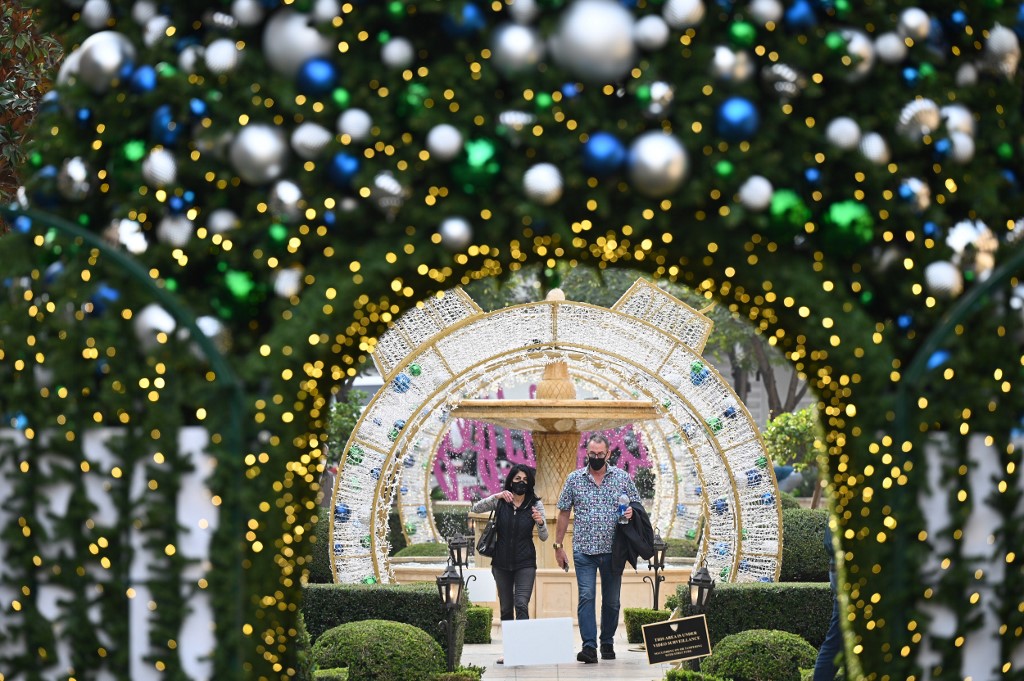Curtailed Christmas could be ‘safest bet’–WHO

People wearing masks to prevent the spread of COVID-19 walk through a holiday season and Christmas outdoor display in Beverly Hills, California, November 23, 2020. (Photo by Robyn Beck / AFP)
The World Health Organization said Monday that avoiding family gatherings would be “the safest bet” over Christmas, insisting there is no zero-risk option for traditional holiday merry-making during the coronavirus pandemic.
WHO officials said it was down to governments to weigh up the economic and social benefits of loosening pandemic restrictions over the festive period, while individuals would have to decide whether they might be putting more vulnerable relatives at risk.
Europe and the Americas are battling rising coronavirus caseloads that are pushing health systems to the brink, forcing governments to issue stay-at-home orders and close businesses heading into the crucial Christmas period.
Maria Van Kerkhove, the WHO’s COVID-19 technical lead, said there were no “zero-risk” options.
“There’s lower risk or higher risk — but there is a risk,” she told a virtual media briefing.
Article continues after this advertisement“This is incredibly difficult because especially during holidays… we really want to be with family but in some situations, the difficult decision not to have that family gathering is the safest bet.”
Article continues after this advertisementShe said everyone would have to take that decision for themselves, weighing up whether they could potentially be bringing the virus into the home of more vulnerable individuals with a higher risk of dying from the disease.
Van Kerkhove suggested that connecting virtually might be the way to go.
“Even if you can’t celebrate together this year, you can find ways to celebrate when this is all over,” the US expert said.
“We are doing that within our own family and we are going to have one heck of a celebration when this is all over.”
‘Confidence and joy’
Michael Ryan, the WHO’s emergencies director, said there was a balance to be struck between the science and the economic and social factors.
However, there was no formula to suggest how long it might be safe to ease restrictions for over the holiday season.
Ahead of the Thanksgiving holiday on Thursday in the United States, Ryan said that after Thanksgiving in neighboring Canada — celebrated this year on October 12 — transmission of the virus increased.
He said there was “no question” that in areas of significant community transmission, further opening up would result in increased transmission.
“The question is: have you got the disease under enough control to start with, and can you allow people a little bit more freedom over the Christmas period which generates a sense of confidence and joy in the community, which people need right now, without letting the virus let rip again?
“It’s a trade-off between these two issues.”
Ryan said national policies were not as clear-cut as the science.
He said: “Each government will have to decide on its policy, based on those trade-offs between the epidemiologic risk versus the economic and social risk of continuing to have people in restricted situation over a holiday period, which will generate genuinely a lot frustration, further fatigue and a lot of pushback.”
For more news about the novel coronavirus click here.
What you need to know about Coronavirus.
For more information on COVID-19, call the DOH Hotline: (02) 86517800 local 1149/1150.
The Inquirer Foundation supports our healthcare frontliners and is still accepting cash donations to be deposited at Banco de Oro (BDO) current account #007960018860 or donate through PayMaya using this link.